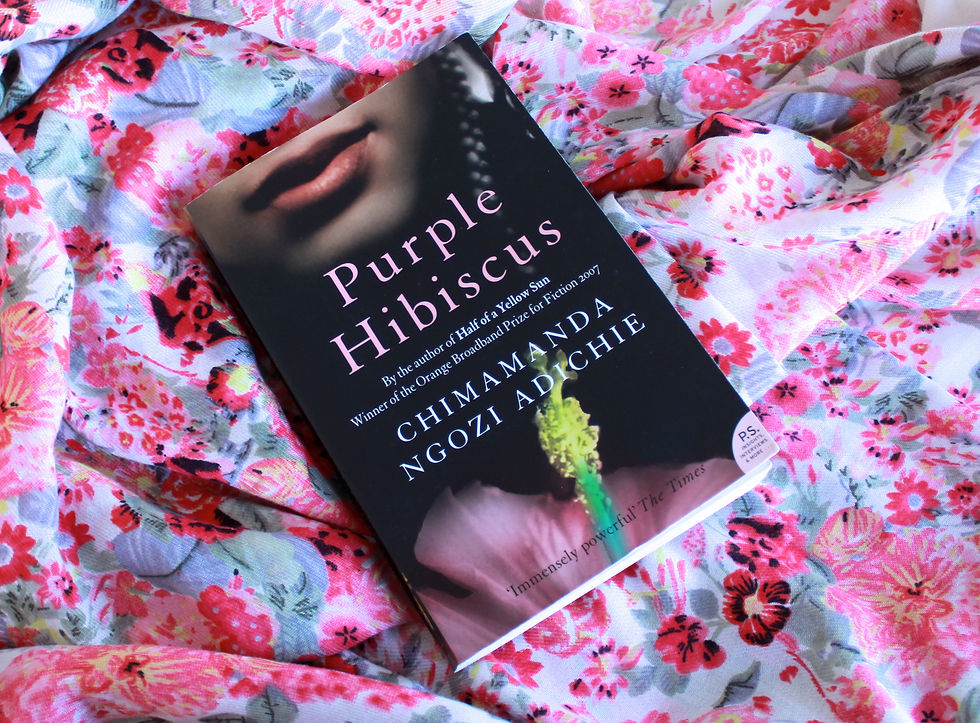PURPLE HIBISCUS BY CHIMAMANDA
- PRISCA
- May 20, 2019
- 4 min read
“Has the devil asked you to go on errands for him?” the Igbo words burst out of papa’s mouth. “Has the devil built a tent in my house?” he turned to mama. “You sit there and watch her desecrate the Eucharist fast, mama Nindi?” He unbuckled his belt slowly. It was a heavy belt made of layers of brown leather with a secret leather-covered buckle. It landed on Jaja first, across his shoulder. Then mama raised her hands as it landed on her upper arm, which was covered by the puffy sequined sleeve of her church blouse. I put the bowl down just as the belt landed on my back.
Sometimes I watched the Fulani nomads, white Jellabas flapping against their legs in the wind, making clucking sounds as they herded the cows across the roads in Enugu with a switch swift and precise. Papa was like a Fulani nomad- although he did not have their spare, tall body- as he swung his belt at mama, jaja and me muttering that the devil would not win.

I know of a 13 year old girl in my neighborhood. She’s full of life and energy.
During the day, she is loud and obnoxious but almost every single night I’ve heard her loudly plea to her parents as they fought, “stop fighting, please LET’S talk it through!”
Some nights she screams it, some nights she yells from the mental frustrations that her parents inflict on her. Her parents’ fights have become her business as she constantly feels the need to protect them from each other.
My heart broke the day I heard her shout ever so loudly at her father, “stop! You’ll kill her! Stop please! You’ll kill her!” only then did I understand why she had become a coward. Her life is about fighting those that are supposed to be fighting for you. Battles fought with loved ones are the worst, we never really win because we can hate what they do but we will never learn to hate them. Her way of showing her strength has become explicit words wrapped around her lips. so it’s all her fault, that she had to drop out of school, that she has to go to bed hungry sometimes, that she can’t wear a pretty dress, that her parents fight, that she just can’t be a normal child and live a care free childhood. It is all her fault and so she is going to be angry for as long as it continues to be her fault.
No one will ever tell this little girl, that it’s not. Because gender based violence is a silent affair, no one is brave enough to say it out loud.
Kambili is not 13 years old like this girl. She is 16 years old and yet the violence in their home takes its toll on her in every aspect of her life. She is shy and introverted. She doesn’t laugh out loud or even cry out loud because in a way she can only do what is expected of her by her father. She has the strength of a 50 year old. And as Chimamanda helps her narrate her story, my heart is filled with remorse.
I’m sorry that a 16 year old has to witness her father beat up her mother to the point of miscarrying.
I’m sorry that a 16 year old has to witness her father cut off her brother’s finger because he didn’t come first in a class at church.
I’m sorry that her feet are burnt with hot water whenever she does something wrong in the name of washing away her sin.
I’m sorry that her father’s insecurities are rubbing off on her mental state.
I’m sorry that she can’t make friends because her father has talked her into believing she has to compete with everyone.
I’m sorry about a lot of things that happen to Kambili throughout the narration of the book.
But I also appreciate that in discovering herself she gets the chance to live outside her parents’ toxic embrace. Their lives change when they are forced to live their home during the time of the Nigerian political unrest and visit their auntie Ifeoma in Nsukka. She is a professor at a university there and has three children. Through interactions with her cousins, auntie Ifeoma and her love interest father Amadi, Kambili learns a lot about love, life and independence. This makes her question her relationship with her father and sees her through to a time of greater freedom from her father’s violence.
Purple hibiscus addressed a lot of questions that arise from violence in homes. No one talks about it openly but the impact that it has on society are great. A person who goes through such violence develops a lot of habits that can impede their contributions to society. Children are the most vulnerable when it comes to this because unlike adults who can sieve what they take seriously, children are great absorbers and they tend to take everything in without question or doubt. I think it’s important that we start the conversation on violence. I think it’s important for us to pick up such books and challenge ourselves to reach out to those that are victims of such ills, to be more aware and informed of what kind of stories are going on around us. Purple hibiscus is every young child’s story in the face of violence and I love that it resolves the matter really well.
With that said, please don’t hesitate to add this book to your list this week or month. Let’s continue on this journey of discovery.
What books have you read that have sparked deep emotion in you? Would really love to hear from you.




Comments